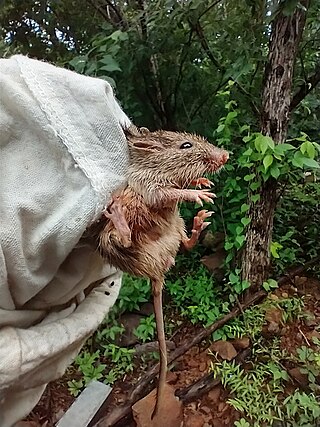
Heteromyidae is a family of rodents consisting of kangaroo rats, kangaroo mice, pocket mice and spiny pocket mice. Most heteromyids live in complex burrows within the deserts and grasslands of western North America, though species within the genus Heteromys are also found in forests and their range extends as far south as northern South America. They feed mostly on seeds and other plant parts, which they carry in their fur-lined cheek pouches to their burrows.

The narrow-skulled pocket mouse is a species of rodent in the family Heteromyidae. It is endemic to western Mexico, living west of the Sierra Madre Occidental crest.

The spiny pocket mouse is a species of rodent in the family Heteromyidae and order Rodentia. It is found in Baja California in Mexico and in Arizona, California and Nevada.

The Trinidad spiny pocket mouse is a species of rodent in the family Heteromyidae. It is found in Colombia, Trinidad and Tobago, and Venezuela.

Heteromys is a genus of rodents in the family Heteromyidae, commonly known as spiny pocket mice. It is the only extant genus in the subfamily Heteromyinae which also includes the extinct genera Diprionomys and Metaliomys. Heteromys was recently enlarged by inclusion of the members of formerly recognized heteromyine genus Liomys, which was found to be paraphyletic.
The southern spiny pocket mouse is a species of rodent in the family Heteromyidae. It is found in Colombia, Ecuador, and Panama.

Desmarest's spiny pocket mouse is a species of rodent in the family Heteromyidae. It is found in Colombia, Costa Rica, El Salvador, Guatemala, Honduras, Mexico, Nicaragua, and Panama.

Gaumer's spiny pocket mouse is a species of rodent in the family Heteromyidae. It ranges over northern Belize and Guatemala and the Yucatán Peninsula of Mexico, where it lives in lowland semideciduous forest and thorn scrub. The species is nocturnal and terrestrial; it is solitary and strongly territorial. It is named after physician and biologist George F. Gaumer, who lived in the Yucatán from 1885 to 1929.
Goldman's spiny pocket mouse is a species of rodent in the family Heteromyidae. It has been reported to be a subspecies of Heteromys desmarestianus. It is found in Guatemala and Mexico. Its natural habitat is subtropical or tropical moist lowland forests.

Nelson's spiny pocket mouse is a species of rodent in the family Heteromyidae. It is found in Mexico and Guatemala. Its natural habitat is subtropical or tropical moist lowland forests. It is threatened by habitat loss.
The mountain spiny pocket mouse is a species of rodent in the family Heteromyidae. It is endemic to Costa Rica. Its natural habitat is subtropical or tropical moist lowland forests.

The Panamanian spiny pocket mouse, also known as Peter's spiny pocket mouse, is a species of heteromyid rodent endemic to Panama. It is very closely related to Salvin's spiny pocket mouse, and has been placed in the same species group by some authors. It was formerly placed in the genus Liomys, which is now recognized to be paraphyletic and has been subsumed into Heteromys.

The Mexican spiny pocket mouse is a species of rodent in the family Heteromyidae. It is native to Mexico and Texas in the United States where it is found in dry, scrubby habitats. The IUCN has assessed it as being of "least concern". It was formerly placed in the genus Liomys, which is now recognized to be paraphyletic and has been subsumed into Heteromys.

The painted spiny pocket mouse is a species of rodent in the family Heteromyidae. It is found in Mexico and the northern tip of Guatemala. It was formerly placed in the genus Liomys, which is now recognized to be paraphyletic and has been subsumed into Heteromys.

Salvin's spiny pocket mouse is a small to medium-sized rodent in the family Heteromyidae. It was formerly placed in the genus Liomys, which is now recognized to be paraphyletic and has been subsumed into Heteromys.
The Jaliscan spiny pocket mouse is a species of heteromyid rodent endemic to Mexico. The specific name spectabilis means "striking", and refers to the animal's relatively bright coloration. It was formerly placed in the genus Liomys, which is now recognized to be paraphyletic and has been subsumed into Heteromys.
The Paraguaná spiny pocket mouse is a South American species of rodent in the family Heteromyidae. It is known from two localities at elevations above 200 m, Cerro Santa Ana and the Fila de Monte Cano, within the Paraguaná Peninsula in Venezuela. While this region consists mostly of arid shrublands, this pocket mouse is found in elevated areas that provide cloud forest or mesic habitat with evergreen and semideciduous vegetation, such as terrestrial bromeliads. It is more likely to be found near streams. The species is threatened by habitat degradation due to goat grazing and development.
The Baja pocket mouse is a species of rodent in the family Heteromyidae. The species occurs in southern California, Baja California and on islands in the Gulf of California.
The overlook spiny pocket mouse is a species of heteromyid rodent endemic to Venezuela.

The cloud-dwelling spiny pocket mouse is a species of rodent (Rodentia) that is endemic to the high elevations of Cordillera de Tilarán and Cordillera de Guanacaste within Costa Rica. It is contained within the Heteromys desmarestianus species complex.













